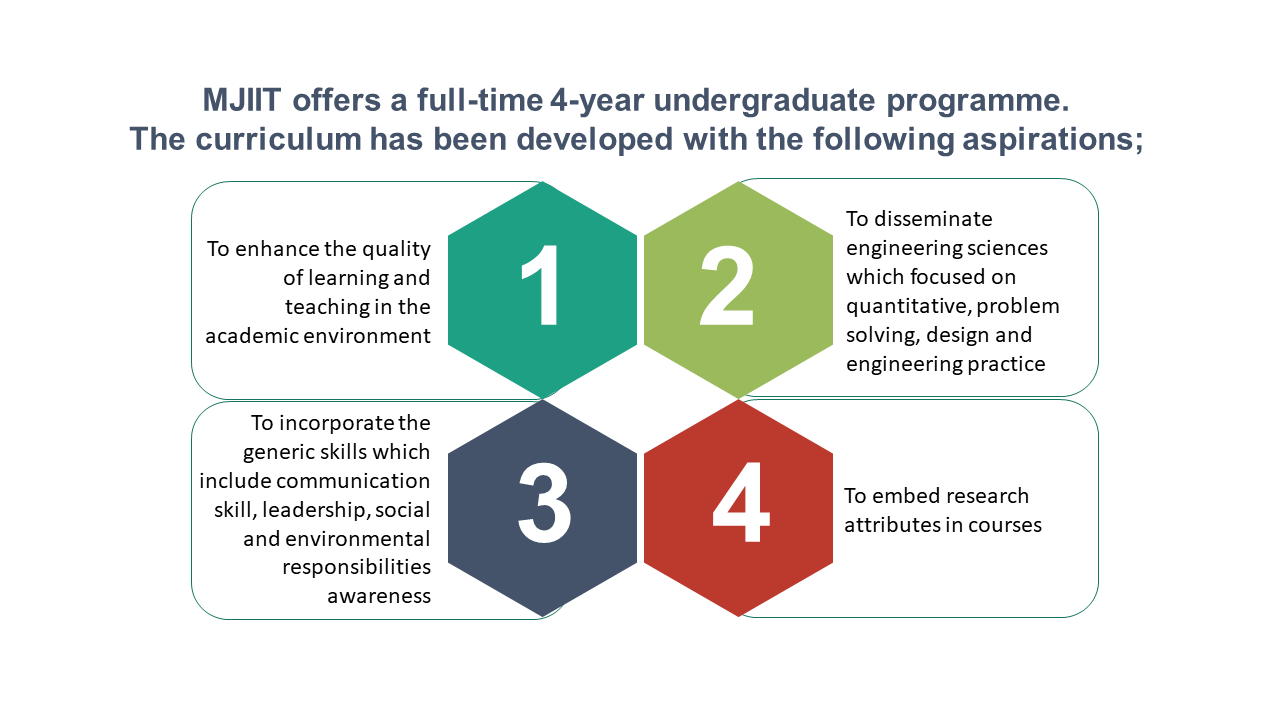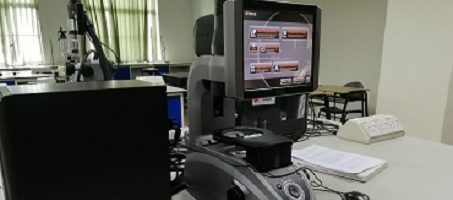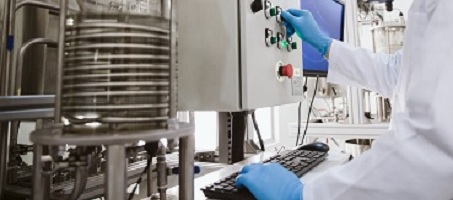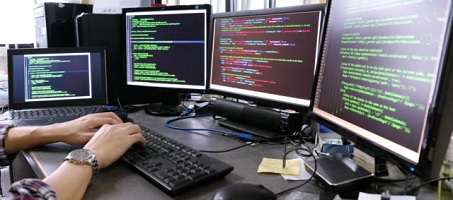UNDERGRADUATE STUDY
 The curriculum provides competence graduates that satisfy the needs of industry. The effectiveness and quality of the curriculum is enhanced with proper assessment techniques on every course. The curricular approach, the educational content and the teaching-learning and assessment methods are appropriate, consistent with, and support the attainment to achieve the Programme Learning Outcomes (LO). Here you can create the content that will be used within the module.
The curriculum provides competence graduates that satisfy the needs of industry. The effectiveness and quality of the curriculum is enhanced with proper assessment techniques on every course. The curricular approach, the educational content and the teaching-learning and assessment methods are appropriate, consistent with, and support the attainment to achieve the Programme Learning Outcomes (LO). Here you can create the content that will be used within the module.
Undergraduate Programs

Bachelor of Electronic Systems Engineering (ESE)
Electronic Systems Engineering is a broad engineering field that encompasses many subfields including those that deal with power, instrumentation engineering, telecommunications, semiconductor circuit design, and many others.
5 Areas : Including Communication, Embedded System, Biomedical, Automation and Material Science
CAREER OPPORTUNITIES
Graduates from this programme can be employed as production engineers, instrumentation engineers, maintenance engineers, design engineers, sales/marketing engineers or pursue postgraduate degrees. They are not easily but high chances in Japanese industries and companies since they have acquired appropriate knowledge, experience and Japanese working culture while studying at MJIIT.

Bachelor of Mechanical Precision Engineering (MPE)
Mechanical Precision Engineering program was designed for students who wish to aquire a solid foundation in mechanical engineering with deep knowledge of the principles and practice of precision engineering.
Precision engineers utilize the principles of precision engineeering, applied physics, mechatronics and manufacturing to help transfer new technologies, discoveries, inventions into machines or products that satisfy demanding accuracy, repeatability and speed requirements.
Elective courses offered are Nano and Micro Technology, Robotics and Mechatronics and Advanced Processing Technology.
CAREER OPPORTUNITIES
Graduates from this program can be employed in positions within classical and emerging fields such as Mechatronics, Micro / Nanomanufacturing, Automotive, Aerospace, Atomic/Molecular Metrology, Micro/Nano-scale Machine & Instrument Design. Graduates of this program will also be prepared for entry into post graduate education.

Bachelor of Chemical Process Engineering (CPE)
The Chemical Process Engineering program is offered to develop the engineers and scientists who can manage problems in construction and operation of complex systems such as energy production systems, chemical plants, food processing systems, biological processes or problems in environmental conservation.
The students will be taught the relevant skills and technologies to find problems in complex systems. The Chemical Process Engineering program provides education on chemical engineering, transport phenomena, fluid mechanics, thermodynamics, reaction kinetics, system control, optimization theory or so on.
Students in this program will acquire the fundamental knowledge and practical skills through lectures and laboratory experiments.
CAREER OPPORTUNITIES
Graduates from this program can seek employment opportunities as process engineers, design engineers, chemical engineers, research engineers, technical sales engineers, commissioning engineers, service engineers in the chemical and biochemical industry, the oil and gas industry, the water and waste water treatment industry, the power station, the food industry, the pharmaceutical industry, the electronic industry, the heavy industry etc.
Graduates of this program will also be prepared for entry into post graduate education either in MJIIT or other universities worldwide.

Bachelor of Software Engineering (SE)
Software Engineering uses an engineering approach in the development, operation, and maintenance of large scale software. A software engineer needs to be able to employ systematic technical and management methods in the creation of high-quality software. The Bachelor of Computer Science specializing in Software Engineering is designed to support the nation’s need for professional and capable software engineers to undertake the task of increasing the effectiveness and performance of both the public and private sectors.
To further support this goal, the course is closely associated with the Malaysian Software Testing Board (MSTB) certifications and Hewlett-Packard (HP) Software Testing Program.
CAREER OPPORTUNITIES
Graduates of the program can work as a Software Engineer, Software Project Engineer, Systems Analyst, Systems Engineer, Software Quality Engineer, Software Configuration Engineer, Software Architect, Software Process Engineer, Software Test Engineer, Software Maintainer, Academician, Researcher, and Software Designer. Graduates of these programs will also be prepared for entry into postgraduate education either in MJIIT or other universities worldwide.
Undergraduate Admission
| Programme | Admission | ||||
| Matriculation | STPM | Diploma | International Students | ||
| 1. | Bachelor of Electronic Systems Engineering (TK97) | Read More | Read More | Read More | Read More |
| 2. | Bachelor of Mechanical Precision Engineering (TK99) | Read More | Read More | Read More | |
| 3. | Bachelor of Chemical Process Engineering (TK79) | Read More | Read More | Read More | |
| To learn more, please visit the following address: https://admission.utm.my/ | |||||
Fees
Malaysian Students
| Programme | Malaysian Students | |||
| Semester 1 Fees | Semester 2 – 8 Fees | Total Fees | ||
| 1. | Bachelor |
Registration (A) : RM 1,200
Services (B) : RM 550
Education (C) : RM 4,300
TOTAL : (A+B+C) : RM 6,050
|
Services (B) : RM 550
Education (C) : RM 4,300
TOTAL (B+C) : RM 4,850
|
RM 40,000
|
Mode of Payment
1. My UTM Portal (http://my.utm.my)
2. UTMSmart Apps
International Students
| Programme | International Students | |||
| Semester 1 Fees | Semester 2 – 8 Fees | Total Fees | ||
| 1. | Bachelor of Electronic Systems Engineering | RM 14,758 | RM 60,242 | RM 75,000 |
| 2. | Bachelor of Mechanical Precision Engineering | RM 14,758 | RM 60,242 | RM 75,000 |
| 3. | Bachelor of Chemical Process Engineering | RM 14,758 | RM 60,242 | RM 75,000 |
| 4. | Bachelor of Computer Science (Software Engineering) | RM 14,883 | RM 61,117 | RM 76,000 |
For more information, click HERE
Mode of Payment
Full payment must be made before registration day to avoid cumbersome during registration. You may settle your payment via the following mode of payment.
1. My UTM Portal (http://my.utm.my)
2. UTMSmart Apps
Payments are in Malaysian currency (Ringgit Malaysia)
Personal Bond Deposit are not included. Based on country, maximum RM 2,000. Personal Bond details
All fees are subject to changes
The exchange rate of 1USD is about RM 4.16 (Subject to change)
Industrial Training
Industrial Training (IT) is a student placement in an industry or outside organization (locally or abroad) for a period of TWELVE (12) weeks. The word ‘industry’ here includes the whole of engineering activities such as consultancy, research and development, manufacturing etc. and the industry can be local or overseas. The training serves as an exposure to the real work environment so that the student can relate theories learned in class and apply them in the workplace to prepare them for their future career as a professional engineer. The IT is designed for a student to practice knowledge gained at university in the workplace as part of the fulfilment of the Bachelor Degree Award. It is compulsory for every MJIIT undergraduate student to undergo Industrial Training for a specified period of time under the course code of SMJG 3206. The primary objective of the IT is to strengthen and broaden the students’ understanding of current practice and knowledge of the latest developments through exposure to a real-working environment and obtained during the training period. In addition, the students are also expected to relate and apply their theoretical knowledge to solve real problems, understanding the requirements of clients and society as a whole. Subsequently, the knowledge gained during IT is expected to be useful for the students to undertake life-long learning as well as to give them sufficient knowledge useful in obtaining employment upon graduation.
There are two (2) models of IT adopted at MJIIT :
- Model 1 : 12 weeks in Industry in Malaysia.
- Model 2 : 12 weeks in Industry in Japan
Students may download the MJIIT IT MANUAL and Related IT forms through ITS (http://its.utm.my/itsv4/).
Undergraduate Laboratories
| No. | Name | PIC |
| 1. | Precision lab | |
| 2. | Solid mechanics | |
| 3. | Mechanics Machine | |
| 4. | Metrology | |
| 5. | Thermodynamics | |
| 6. | Fluid dynamics | |
| 7. | Technical service centre | |
| 8. | Materials lab | |
| 9. | Automation lab |
| No. | Name | PIC |
| 1. | Communication lab | |
| 2. | Electronic lab | |
| 3. | Signal & Image Processing | |
| 4. | ECAD PCB | |
| 5. | Simulation Lab | |
| 6. | Electrical circuit | |
| 7. | Fabrication workshop | |
| 8. | Control & Measurement | |
| 9. | Electronic device Bioelectronic & Biomedical | |
| 10. | lab | |
| 11. | Ind. automation lab | |
| 12. | Robotic lab | |
| 13. | Embedded system lab | |
| 14. | Industrial instrumentation | |
| 15. | Control & Measurement |
| No. | Name | PIC |
| 1. | Bioprocess Laboratory | |
| 2. | Unit operatios laboratory – pilot scale | |
| 3. | Chemicaal/Biochemical Reaction – pilot scale | |
| 4. | Environmental Laboratory | |
| 5. | Chemistry Lab |
| No. | Name | PIC |
| 1. | Computer lab (ESE) | |
| 2. | Language Lab (4) | |
| 3. | CAD CAM 2 | |
| 4. | Computer lab (EGT) | Fawzi |
| 5. | Computer lab (MPE) | |
| 6. | IT Data Centre + support room | IT Manager |
| 7. | Self learning facility (2) |
Final Year Project
Semester Info
Need Assistance?
